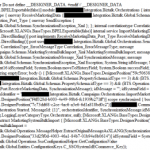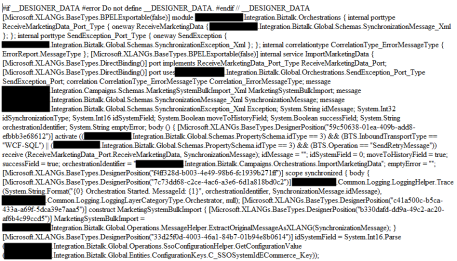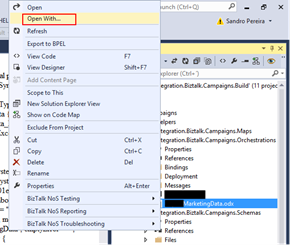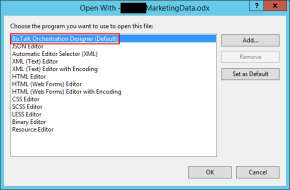This post was originally published here
While trying to open a BizTalk Orchestration inside Visual Studio, normally a simple and easy double-click operation to open the BizTalk Orchestration Designer, I got a very famous behavior: BizTalk Orchestration didn’t open with the BizTalk Orchestration Designer, instead, it opened with the XML (Text) Editor
This behavior is happening to me a lot these last days. At first, I simply didn’t care because I know how to quickly workaround it, after a few times it just becomes annoying, after a few days and several orchestrations and different projects I got intrigued an entered in “Sherlock Holmes” mode.
Cause
Well, I don’t know exactly what can cause this problem but I suspect that this behavior happens more often when we migrate projects, or when we try to open previous BizTalk Server versions projects in recent versions of Visual Studio, special if we skip one or more versions, for example: from BizTalk Server 2010 to 2013 R2.
And may happen because of different configurations inside the structure of the “<BizTalk>.btproj” file.
The cause of this strange behavior, is without a doubt related with a mismatch setting inside the structure of the “<BizTalk>.btproj” file in the XLang nodes (each orchestration inside your project will reflect to one XLang node specifying the name of the file, type name and namespace. Normally it has this aspect in recent versions of BizTalk Server:
<ItemGroup>
<XLang Include="MyOrchestrationName.odx">
<TypeName> MyOrchestrationName </TypeName>
<Namespace>MyProjectName.Orchestrations</Namespace>
</XLang>
</ItemGroup>
But sometimes we will find an additional element:
<ItemGroup>
<XLang Include="MyOrchestrationName.odx">
<TypeName> MyOrchestrationName </TypeName>
<Namespace>MyProjectName.Orchestrations</Namespace>
<SubType>Designer</SubType>
</XLang>
</ItemGroup>
When the SubType element is present, this strange behavior of automatically open the orchestration with the XML (Text) Editor.
Solution
First, let’s describe the easy workaround to this annoying problem:
- On the solution explorer, right-click on the orchestration name and then select “Open With…” option
- On the “Open with …” window, select “BizTalk Orchestration Designer” option and click “OK”.
This will force Visual Studio to actually open the orchestration with the Orchestration Design. But again, this will be a simple work around because next time you try to open the orchestration inside Visual Studio it will open again with the XML (Text) Editor.
You may think that inside the “Open with …” window if we:
- Select “BizTalk Orchestration Designer” option, click “Set as Default”
- And then click “OK”.
It will solve the problem, but you are wrong, actually, if you notice in the picture above it is already configured as the default viewer.
So, to actually solve once and for all this annoying behavior you need to:
- Open the “<BizTalk>.btproj” (or project) file(s) that contain the orchestration(s) with this behavior with Notepad, Notepad++ or another text editor of your preference.
- Remove the <SubType>Designer</SubType> line
- Save the file and reload the project inside Visual Studio
If you then try to open the orchestration it will open with the BizTalk Orchestration Designer.



